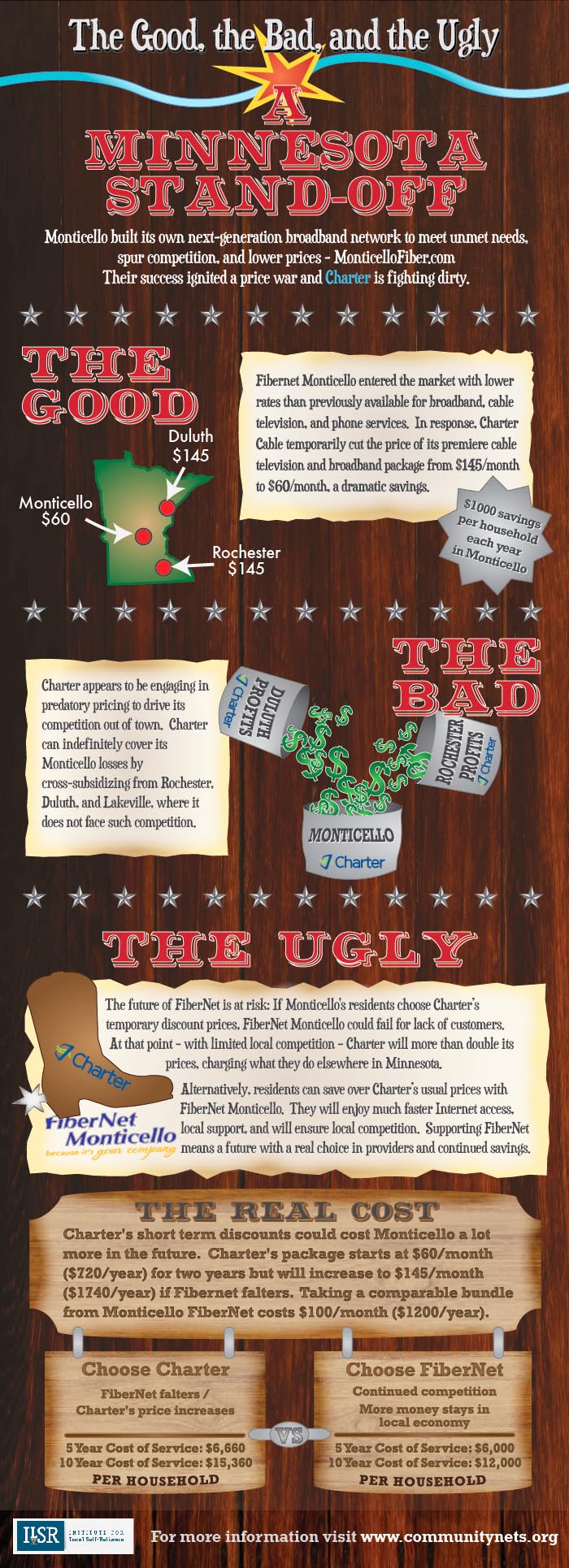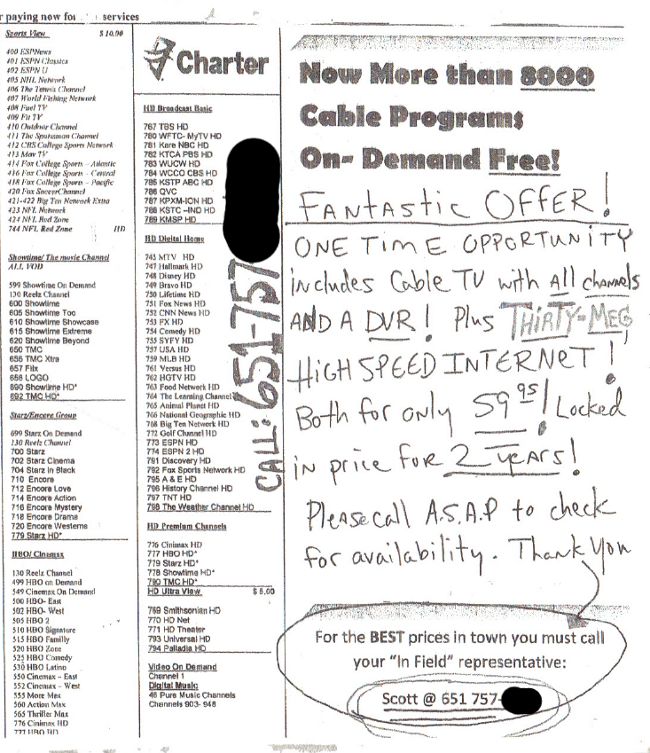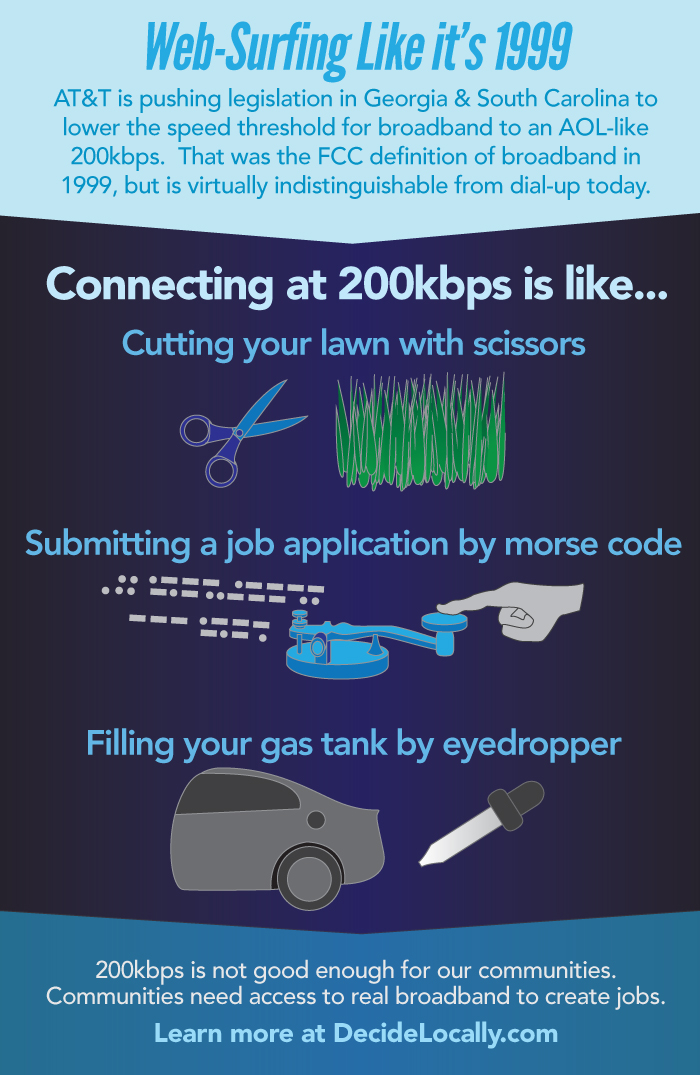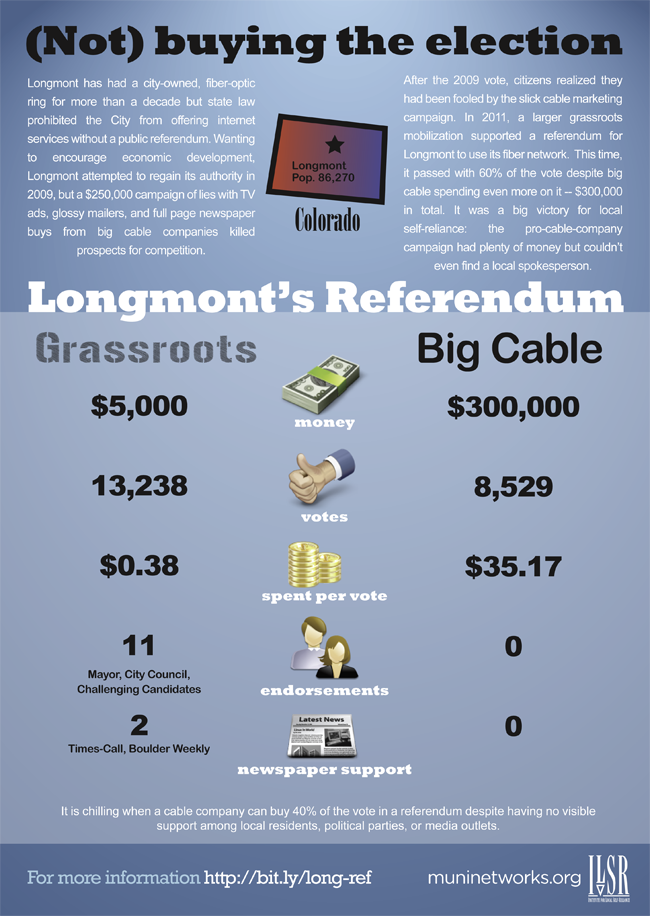Charter Fights Dirty to Kill Competition in Monticello
When Monticello, Minnesota, decided to build its community fiber network -- Fibernet Monticello -- it expected the incumbents to lower their prices and fight to keep subscribers. But Monticello had no idea the lengths to which they would go.
The telephone incumbent, TDS, delayed the project for a year with a frivolous lawsuit and then built its own fiber-optic network while dramatically lowering its prices. We have yet to find another community in North America with two citywide FTTH networks going head to head.
Because of the city's network, Monticello's residents and businesses have access to better connections than the biggest cities in Minnesota can get.
Now, Charter has weighed in by cutting its rates to what must be below cost to gain subscribers. It reminded us of a shoot-out, so we created this infographic to explore what is at stake.
 Download a higher resolution PDF here.
Charter has taken a package for which it charges $145/month in Rochester, Duluth, Lakeville, and nearby Buffalo (MN) and is offering it for $60/month - price guaranteed for 2 years. A Monticello resident supplied us with this flyer, which this person had received multiple times at their home over the course of a month. (See below for the full flyer).
Download a higher resolution PDF here.
Charter has taken a package for which it charges $145/month in Rochester, Duluth, Lakeville, and nearby Buffalo (MN) and is offering it for $60/month - price guaranteed for 2 years. A Monticello resident supplied us with this flyer, which this person had received multiple times at their home over the course of a month. (See below for the full flyer).
 This is either predatory pricing or the cable industry is out of control with its rate increases. If that package costs Charter more than $60/month to supply, then it is engaging in predatory pricing to drive competitors out of the market. Consider that Charter may be taking a loss of $20/month ($240/year) from each household that takes this offer.
This is either predatory pricing or the cable industry is out of control with its rate increases. If that package costs Charter more than $60/month to supply, then it is engaging in predatory pricing to drive competitors out of the market. Consider that Charter may be taking a loss of $20/month ($240/year) from each household that takes this offer.
 Download a higher resolution PDF here.
Charter has taken a package for which it charges $145/month in Rochester, Duluth, Lakeville, and nearby Buffalo (MN) and is offering it for $60/month - price guaranteed for 2 years. A Monticello resident supplied us with this flyer, which this person had received multiple times at their home over the course of a month. (See below for the full flyer).
Download a higher resolution PDF here.
Charter has taken a package for which it charges $145/month in Rochester, Duluth, Lakeville, and nearby Buffalo (MN) and is offering it for $60/month - price guaranteed for 2 years. A Monticello resident supplied us with this flyer, which this person had received multiple times at their home over the course of a month. (See below for the full flyer).
 This is either predatory pricing or the cable industry is out of control with its rate increases. If that package costs Charter more than $60/month to supply, then it is engaging in predatory pricing to drive competitors out of the market. Consider that Charter may be taking a loss of $20/month ($240/year) from each household that takes this offer.
This is either predatory pricing or the cable industry is out of control with its rate increases. If that package costs Charter more than $60/month to supply, then it is engaging in predatory pricing to drive competitors out of the market. Consider that Charter may be taking a loss of $20/month ($240/year) from each household that takes this offer.


 Feel free to spread it around. Higher quality pdf below.
Feel free to spread it around. Higher quality pdf below.

 #6 is a great explanation of why communities should directly invest in broadband. Local economic growth and secondary investment enabled by broadband expansion is 10 times the initial investment.
Think about that. While private companies have long built, owned, and operated most of the broadband networks, they have seriously underinvested. They underinvest because they cannot monetize many of the benefits from broadband. Faster, more reliable connections simply do not translate into more revenue for cable and telephone companies. So the big incumbents have largely ceased investing in next-generation networks.
These massive corporations do not care about the growth of secondary investments or other spillover effects from better broadband in communities because it does not change their bottom line -- the one thing they are supposed to prioritize over all other matters.
This is why communities should be investing in themselves. Communities do care about secondary investments and spillover benefits from broadband. In fact, they are specifically tasked with investing to benefit the community!
So when it comes to maximizing the benefits of broadband, community investments tend to make a lot of sense... and other secondary benefits.
#6 is a great explanation of why communities should directly invest in broadband. Local economic growth and secondary investment enabled by broadband expansion is 10 times the initial investment.
Think about that. While private companies have long built, owned, and operated most of the broadband networks, they have seriously underinvested. They underinvest because they cannot monetize many of the benefits from broadband. Faster, more reliable connections simply do not translate into more revenue for cable and telephone companies. So the big incumbents have largely ceased investing in next-generation networks.
These massive corporations do not care about the growth of secondary investments or other spillover effects from better broadband in communities because it does not change their bottom line -- the one thing they are supposed to prioritize over all other matters.
This is why communities should be investing in themselves. Communities do care about secondary investments and spillover benefits from broadband. In fact, they are specifically tasked with investing to benefit the community!
So when it comes to maximizing the benefits of broadband, community investments tend to make a lot of sense... and other secondary benefits. 